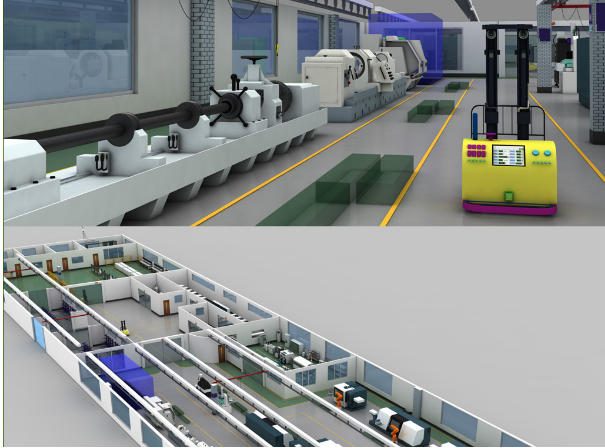Smart factories are the core elements of Industry 4.0. In the smart factory, not only the single equipment is required to be intelligent, but also all the facilities, equipment and resources (machines, logistics equipment, raw materials, products, etc.) in the factory are interconnected to meet the requirements of intelligent production and intelligent logistics. Through the communication network such as the Internet, all things inside and outside the factory are interconnected to form a new business model.

In a sense, Industry 4.0 uses the CPS system to intelligently upgrade production equipment, enabling it to intelligently analyze, judge, self-adjust, and automatically drive production based on real-time information to form an autonomous distributed system (ADS). The smart factory ultimately realizes large-scale, low-cost customized production in the manufacturing industry.
When building smart factories, we must focus on four major technical issues: modularization, digitization, automation, and intelligence. Modularization is the precondition for realizing the large-scale production of smart factories and personalization of customer needs. This requires the transformation of major component suppliers to module suppliers, and participates in product design, supply mode selection and unitized logistics planning.
Digital, vertical view is to achieve digital modeling and interconnection of all levels within the factory, and even for each device; horizontally, it is a full-process supply chain integration system that creates customer requirements, product design, supplier integration, manufacturing and logistics services. .
Intelligent, manufacturing companies should build a virtual and real integration system, according to the customer's personalized needs, to achieve virtual design, manufacturing and assembly, and then through the smart factory to complete the manufacturing process, effectively solve the custom product cycle, low efficiency, high cost problem. In the smart factory, the company can realize zero-distance dialogue with the customer, and the customer can participate in the whole process of the product “intelligence†through various means.
Intelligent production for Industry 4.0In the era of Industry 4.0, with the full penetration of information technology into the manufacturing industry, high-flexibility allocation of production factors and mass-customized production can be realized, thereby breaking the traditional production process, production mode and management method.
The future is the era of intelligent networked production, not only a single factory, but a multi-factory enterprise will build a virtual manufacturing system through networking, providing comprehensive intelligent support for enterprise production. Standardized, modular and digital product design is the prerequisite for intelligent production.
The German automotive industry has taken the lead in introducing the concept of low-cost customization, product design has achieved standardization and modularization, and production has achieved comprehensive information and deep automation, basically achieving intelligent production, intelligent assembly, intelligent logistics and intelligent supply chain management. .
Take the BMW 3 Series as an example. The engines from 325i to 335i share the same production line. Most of the hardware is universal, but the engine products are diversified by matching different electronic control and software products. The core foundation of cost and customized production is standardization. To this end, BMW can meet the market demand for mass customization of each off-line model without changing the production cycle, that is, every BMW car is produced according to customized customization.
Manufacturing companies in the era of Industry 4.0 no longer push production from the top down, but start from the customer's needs, realize the whole process of production, order, custom design, procurement, logistics, production planning to production, and realize each through virtual and real integration. Interconnection of links. This efficient and flexible production method also represents the future direction of the manufacturing industry.
Intelligent Logistics for Industry 4.0In the era of Industry 4.0, customer demand is highly personalized, product innovation cycle continues to shorten, and production tempo is accelerating. These are not only important issues for intelligent production, but also great challenges for logistics systems that support production.
Intelligent Logistics is a core component of Industry 4.0. Within the framework of the Industry 4.0 Smart Factory, intelligent logistics is an important link between supply, manufacturing and customers, and the cornerstone for building a smart factory of the future. Intelligent unitized logistics technology, automatic logistics equipment and intelligent logistics information system are the core elements for building intelligent logistics.
As the leading logistics planning and application research institution in Europe, and the frontier position of industrial 4.0 logistics technology research and application research, the German Logistics Research Institute (Fraunhofer IML) independently developed the in Bin intelligent turnover box technology. The intelligence of the logistics unit is realized by adding the sensing and intelligent control unit to the tote.
The smart box can independently manage the inventory in the box, and can report the status of the smart box in time to the superior system, realizing the functions of automatic goods and replenishment. The smart box-based conveyor system can adopt decentralized control technology. The smart box is no longer a passive unit, but a “master†who gives orders to the conveyor system. Under the command of the smart box, the conveyor system can automatically deliver the box to its destination.
On the other hand, intelligent, efficient and flexible logistics systems for Industry 4.0 can be realized through the integration of smart boxes with intelligent logistics equipment such as shuttles. In 2003, the German Logistics Research Institute took the lead in developing the world's first light-duty high-speed shuttle MulTI Shuttle, opening a new era of highly flexible automated logistics systems. Based on the MulTI Shuttle, the German Logistics Research Institute developed the MulTI Shuttle Move, an amphibious shuttle that can be used on the shelves and the ground in 2011, to open up the traditional barriers of logistics and production.
In 2014, Rack Racer, a self-climbing spider, was launched, breaking the last bottleneck of shuttle technology – the limit on the flow of the hoist. Unlike traditional shuttles, the MulTI Shuttle Move can “think†independently. That is, in the process of walking, which devices need to communicate with each other, and how to deal with obstacles... can be solved intelligently and independently.
Shenzhen GEME electronics Co,.Ltd , https://www.gemesz.com